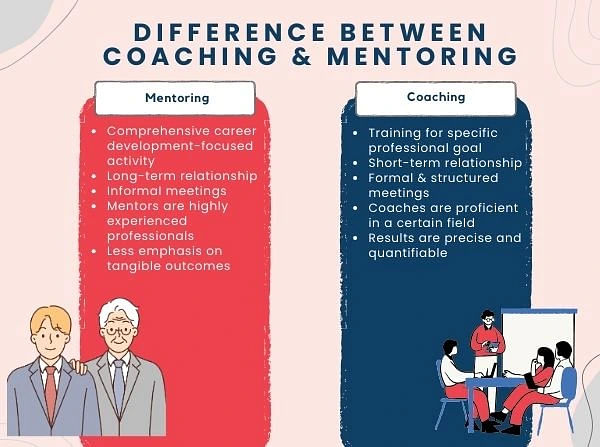The basic difference between coaching and mentoring is that in coaching, a trained coach gives expert knowledge about a particular objective, and in mentoring, a mentor guides about a certain issue with his experiences of life.
The difference between coaching and mentoring is that coaching involves professional training by an expert to achieve short-term goals, while mentoring offers a long-term, in-depth connection providing insights into one's strengths and weaknesses.
Difference Between Coaching and Mentoring
The difference between coaching and mentoring related to the objective, pattern, orientation of the relationship, and expertise is discussed briefly in the table below for student's understanding of mentoring and coaching.
| Particulars | Coaching | Mentoring |
| Main Objective | The goal of coaching is to increase the professional's performance while working. | Mentoring is more career-development-focused, looking beyond the professional's current job function and adopting a more comprehensive approach. |
| Duration | Short term | Long term |
| Orientation | Task-based | Relationship |
| Pattern | Traditionally more structured, with regularly scheduled meetings, like weekly, bi-weekly, or monthly. | Generally, meetings tend to be more informal on an as-needed basis required by the mentee. |
| Expertise | Coaches are chosen for their proficiency in a certain field, which the coachee hopes to develop. Examples include sales, leadership, interpersonal communication, and presentation abilities. | Mentors are more experienced and senior than mentees in a certain field. The mentor's knowledge and inspiration are passed on to the mentee. |
| Purpose | Results from coaching agreements are precise and quantifiable, demonstrating advancement or constructive change in the intended performance area. | The results of a mentoring relationship might fluctuate and alter over time. Less emphasis is placed on tangible outcomes or altered behavior, and more emphasis is placed on the mentee's entire growth. |
What is Coaching?
An active training session conducted with the aim to improve abilities, deal with problems, and foster personal growth in a variety of contexts, including life coaching, job guidance, and coaching for sports, is known as coaching.
- A qualified person, referred to as a coach, assists an individual, known as the coachee, in achieving personal or professional goals through the practice of coaching.
- It usually entails one-on-one or group sessions when the coach gives the coachee advice, encouragement, and feedback to help them recognize and work toward their goals.
Who is a Coach?
A coach is a person who has received the necessary training and credentials to advise, assist, and impart knowledge to the coachee, also known as a coach. Coaches specialize in a variety of areas, including sports, professional growth, personal development, and specific talents.
- Helping their clients or coachees develop and achieve goals, get over obstacles, and realize their full potential is their main responsibility.
- Coaches frequently use listening, questioning, feedback, and methods to help their clients achieve their goals.
- They may not be specialists in the coachee's area of expertise, but they do have the ability to support the coachee's learning and progress on the personal and professional levels.
Also Check: Skill Development Courses List for Students 2023
What is Mentoring?
Mentoring means guiding the mentee through profession, personal development, or a particular area of interest, and mentors depend on their own experiences and knowledge.
The main goal of mentoring is to promote the mentee's development, learning, and general growth.
- In order to assist the mentees in achieving their objectives and making wise judgments, it frequently entails sharing insights, giving helpful criticism, and serving as role models.
- In an expert mentoring relationship, a more informed and qualified person, known as a mentor, offers advice, assistance, and direction to a younger person, known as a mentee.
Who is a Mentor?
A mentor is a competent and experienced person who voluntarily offers advice, support, and assistance to a mentee who has less experience. In order to assist the mentees to grow emotionally or as professionals, mentors frequently assist them in a certain sector or area.
- Mentors frequently share insights, advice, and wisdom to help mentees reach their objectives, make wise choices, and navigate their professional or personal growth.
- The relationship between a mentor and mentee is typically longer-lasting and more extensive than that of a coach, and it is distinguished by an emphasis on the mentee's entire growth and educational experience.
Also Check: 5 Key Steps for Career Planning and Development
Similarities Between Coaching and Mentoring
Although coaching and mentoring may have distinct objectives and employ various strategies, the concept of development serves as the cornerstone of their similarities. Coaching and mentoring may be extremely beneficial to an individual as well as the company through this growth.
Their similarities include the following:
- Self-control and awareness are necessary for coaching and mentoring.
- Both rely on developing relationships, usually one-on-one.
- Compassion, attentive listening, and the capacity to offer helpful feedback are necessary for coaching and mentoring.
- Effective mentors and coaches are flexible and perceptive.
- The success of coaching and mentoring depends on the commitment of all involved parties.
Benefits of Mentoring and Coaching
Both mentoring and coaching have several advantages that, when used properly, can be advantageous to the person receiving mentoring or coaching as well as the mentor or coach and the organization. The following are some advantages of coaching and mentoring.
- Coaching and mentoring are two incredibly powerful learning strategies.
- Both mentoring and coaching can be formal or informal, with coaching frequently perceived as being more formal while mentoring is seen as being more informal.
- When used together, both can improve employee engagement and retention.
- Every organization or business structure may easily incorporate mentoring and coaching, and more and more businesses are doing so.
- Both mentoring and coaching can boost the self-assurance and social skills of the mentor or coach and the person receiving it.
- It can motivate people, help them believe in their skills, and make them more successful in the industries they choose.
- Both mentoring and coaching involve the capacity to forge strong connections and communicate effectively.
Also Check: Guide to 12 Types of Modern Teaching Methods
Skills Required for Mentoring
The following are the skills required for any qualified person to be a mentor and bring out the maximum potency:
- Helping and compassion are two of the most crucial qualities a mentor should have. A great method to support the community and the next generation is through mentoring.
- Assistance: Being able to assist pupils in your area of expertise is both a highly rewarding and special ability to develop. Mentors offer their mentees first-hand expertise, experience, and focused assistance to help them develop.
- Communication and Interpersonal Skills: Mentors must have the ability to connect with their mentees and mentor them effectively.
- The long-term engagement of mentees and mentors is essential to the success of mentoring. Long-term commitment and maintaining a great partnership are crucial.
Skills Required for Coaching
The following are the skills required for any qualified person to be a Coach and bring out the maximum potency:
- In order to establish a relationship of equality of opportunity, the coach and coachee must have equal respect and comprehension for one another.
- Maximize Potential: Coaches work to make the most of the mentee's abilities and resources.
- Intuitivity: Like mentors, coaches must have a strong sense of intuition in order to identify a coachee's talents and set goals for them.
- Troubleshooting Techniques: Coaches approach challenges in an efficient and organized way, and they teach their mentees to
- Competence to increase awareness and accountability among the person being coached as well as the general office and organizational environment.
- Mentors should have and practice practical abilities to translate discussions into actions.











